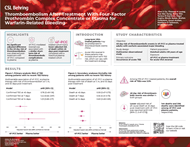
Tap Image to view Graphical Abstract
Request | Ask a Question | View Article
INR and vitamin K–dependent factor levels after vitamin K antagonist reversal with 4F-PCC or plasma

Tap Image to view Graphical Abstract
Request | Ask a Question | View Article
Milling TJ Jr, et al., Ann Emerg Med 2016
Request | Ask a Question | View Article

Tap Image to view Graphical Abstract
Goldstein JN, et al., Lancet 2015
Request | Ask a Question | View Article
Refaai, MA, et al., Transfusion 2015
Request | Ask a Question | View Article

Tap Image to view Graphical Abstract
Request | Ask a Question | View Article
Pabinger I, et al., Ann Hematol 2010
Request | Ask a Question | View Article
Pabinger I, et al., Thromb Haemost 2008
Request | Ask a Question | View Article
Pharmacokinetics of BERIPLEX P/N prothrombin complex concentrate in healthy volunteers
Ostermann H, et al., Thromb Haemost 2007Request | Ask a Question | View Article
Lorenz R, et al., Eur J Gastroenterol Hepatol 2003
Request | Ask a Question | View Article





